RCMP150: Our people, our story
On this page
- Constable Carol Locke: A career like no other
- Joe Roberts: Delivering inspiration to promote change
- Sam Jaroudi: Supporting the frontline and serving communities
- Corporal Crystal Caribou: Fulfilling a life-long dream to help others
- Fred Davis: Small-town boy finds big career with RCMP
- Corporal Maureen Greyeyes-Brant: Walking my Red Road to my forever career
- Sergeant Kelly Willis: A passion for adventure and helping
- Corps Sergeant Major Alan McCambridge: A lifelong dedication to rescue and protection
This year, we're marking our 150th anniversary as Canada's national police service. To commemorate this historic milestone, current and former employees are sharing their personal stories about the RCMP.
Follow along as they share their lived experiences and insights – in their own words.
Constable Carol Locke: A career like no other

I wanted to help people
It sounds very cliché, but I became a police officer to help people. Prior to joining the RCMP, I worked as a youth corrections officer in Portage la Prairie, Manitoba. I regularly interacted with young people, and I decided to become a police officer to help youth before they got involved in criminal activity.
I became a Mountie in March 2003 and in all my postings, I've made an effort to be an active part of the community. In Chemawawin, Manitoba, I put my over 20 years of hockey and ringette experience to good use and helped coach the youth hockey team. I've participated in school activities in every community I've been posted to. I make sure I am doing whatever I can to help ensure there's safe youth programming because it can make a huge difference in the community.
Learning how to be independent, but relying on others when needed
I am the first female RCMP member to have postings in all three of Canada's northern territories, and I've spent my entire RCMP career in Canada's North; it's an incredible privilege. Growing up in rural Manitoba, I didn't travel a lot. With the RCMP, I've lived in northern Manitoba, Nunavut, Northwest Territories, and Yukon and I've enjoyed every minute of it. I've been posted to the most northern RCMP post in Canada (Grise Fiord), and two postings on the Arctic Circle. Working in isolated and remote northern communities forces you to get out of your comfort zone. It's made me very independent, but I've also learned how critical it is to build positive working relationships with community partners and local knowledge experts. Living in incredibly remote communities sometimes means additional resources are hours, or even days, away. I've worked on search and rescue files where the RCMP is part of a bigger team made up of local emergency medical services, community leaders, and residents with expertise of the area, and we've had to work together to ensure a successful outcome.
Advice to anyone interested in becoming a Mountie? Go for it!
When I joined 20 years ago, there was no way I could have predicted the incredible journey I would have. Has it been challenging? Yes, sometimes. Can the remoteness test you mentally and physically? Absolutely. I've been so lucky to have a strong support system (which earlier in my career, included my dog, Boots,) which helped me get through the challenging times. I've also learned so much about myself, about the resiliency of Canadians, and the diversity of this country. I've been particularly privileged to serve in various Cree, Dene, and Inuit communities throughout my career and I have learned so much about their cultures from this firsthand experience.
Throughout my career with the RCMP, I've travelled across Canada, something I wouldn't have been able to do otherwise. I've made life-long friends and I've seen the stunning beauty of Canada's North. From my living room window, looking out into the Arctic ocean, I've seen narwhals, whales, seals, and polar bears…how many people can say that? So if you're looking for a career that truly is a nonstop adventure, a policing career with the RCMP may be for you.
Joe Roberts: Delivering inspiration to promote change
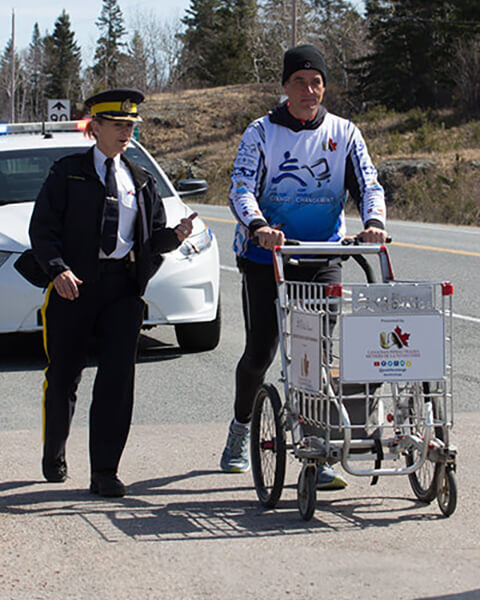
Joe Roberts is an accomplished businessman. His path to success, however, got off to a rocky start. He speaks about that – his experience with family violence, substance abuse, mental health and police – to audiences across North America. He also talks about how he turned his life around and with the help of family and friends, made a commitment to push for change. Read about Roberts's journey and how it has impacted two RCMP officers.
Mr. Roberts:
I grew up in Barrie, Ontario, when it was a much smaller town.
My dad passed away suddenly when I was nine. A lot of bad things happened after that – I began using drugs, an abusive step-father came into my life, I dropped out of school and experimented with more dangerous drugs.
I was periodically homeless from the ages of 15 to 22.
In 1986, I came out to Vancouver, where things went bad very quickly. From partying to entering that foray of heavy drug use, I became that guy pushing a shopping cart to survive.
My mom eventually came out in 1991 and rescued me. She provided what you would now call a Housing-First strategy, but she really couldn't do a lot to help with my drug and mental-health problems.
My substance abuse persisted and one day she walked into my bedroom, and on the edge of the bed beside me was a handgun.
She freaked out and called the police.
(Scott MacLeod, a constable with the Ontario Provincial Police, responded to the call)
That was my big break
It's amazing to think about it now but all he knew going in was, “despondent male, armed, in the basement.”
He didn't greet me like a criminal. He didn't see a man who was a threat, he saw a kid who was in trouble.
His actions were emphatic and he diffused a very dangerous situation.
I think in many ways he was 35 years ahead of his time. Instead of me getting cuffed up and sent to jail, I got an ambulance ride to the hospital, the mental health unit, and over the next couple of days I stabilized.
After a long road, I eventually went to college, got involved in sales and marketing, returned to Vancouver started a website development company.
I went from pushing a shopping cart and being on the streets to being a successful businessman. But I made a promise when I was homeless: If I ever was able to get out of it, I'd pay it forward.
(In 2012, Roberts created The Push for Change, a registered charity to help end youth homelessness and in 2016-17 he pushed a shopping cart across Canada to raise awareness about the issue.)
Now I get to tell a great story
Last year, I spoke 140 times and this year I'll likely do 120 talks.
I talk about my story to raise awareness about youth homelessness and I talk to business leaders, youth, and police.
My role is to touch, move, honour, and inspire, and to try and leverage my story in an inspirational way.
I have spoken in various places across Canada where RCMP have a presence.
When I reflect back on that moment in my mom's basement, the last person I wanted to see was a cop. I never saw police as my ally, never saw them as having my best interest.
(Constable Serge Landry and Constable Amy Handrahan, who are based in Nova Scotia and Prince Edward Island respectively, attended an RCMP Youth Leadership Workshop in Regina in February, where Roberts was a keynote speaker)
Constable Landry:
Roberts' story was so powerful and he was so humble.
It hit home for me because I have an aunt who went through some of the things he experienced when he was homeless.
I feel his talk inspired my style of policing. He made me think more about the person I'm dealing with and not the offence. I just need to help one person not become involved in the criminal justice system
Mr. Roberts:
When I come into a room of police leaders, I feel I'm there to remind them of the enormous good they do each and every day.
But let's face it, it's a profession where you see too much, so when things get dark and gloomy: what's your next step?
I think it's important to stay grounded in possibility. Now that's easier said than done.
Constable Handrahan:
I think that part is true because I know we have an impact on people's lives, but we definitely don't hear about it a lot.
And it doesn't have to be someone who's turned their life around to become a chief executive officer.
I think if you take away the addictions and the mental health problems, the people who we deal with, more times than not, are good people, who don't want to hurt anybody.
We have to help give them that chance to lead a better life.
Mr. Roberts:
Possibility was hard to see in me but others saw it in me so as an officer don't underestimate the good you're doing because it doesn't always make the front page.
I think police need to show up every day, stay focused, and focus on that person in front of you and do your very best to support them on their journey.
Sam Jaroudi: Supporting the frontline and serving communities
Embarking on a career with the RCMP
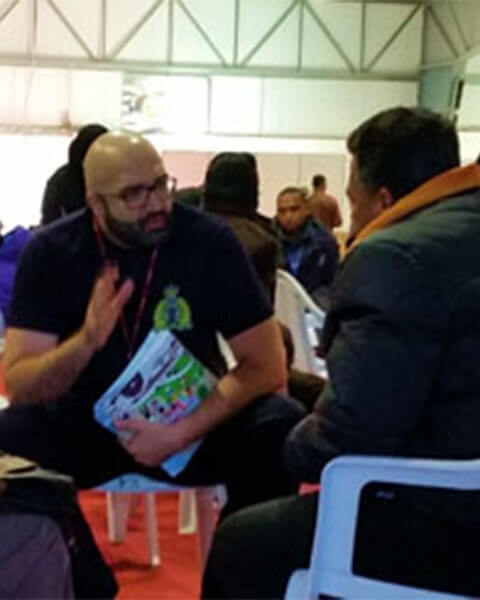

As a resident of Ottawa, and long before the days of social media, you didn't hear much about the RCMP, and I definitely did not consider this organization as a potential employer. That all changed in the Fall of 1999, when I applied to a Federal Government placement program for recent university graduates. I attended an interview at 1200 Vanier Parkway, and I was offered the job on the spot. It was a 4-month contract, and I accepted without hesitation, thinking it would be good experience to add to my résumé for future employers. I was unaware that this would be the start of the rest of my career with the RCMP.
As a Temporary Civilian Employee, I had one contract followed by another, until I became a Civilian Member in 2003. I still remember the day I was going to be sworn-in as a Civilian Member, and how a senior colleague told me that this would be a moment that I would never forget. She was right; however, this was just one of many more memorable moments to come over the next 20 years.
An employer with so much to offer
This organization has provided me with many incredible work opportunities that only the RCMP could offer. Working for National Youth Services, I travelled to every Province and Territory and visited every Division to support the rollout of the Youth Criminal Justice Act. Then a couple of years later, I got the opportunity to visit the Divisions again and many detachments to assist them with the development of their Emergency Operational Plans. In 2008, I moved to Federal Policing where I experienced the true reach of the RCMP's mandate; from working locally with communities, and nationally with Federal and Provincial partners, to internationally with the Five Eyes and other National Security allies.
Many meaningful and impactful projects followed, including the deployment to Jordan to engage Syrian newcomers before their journey to Canada; and in 2017, I returned to Contract and Indigenous Policing, where I experienced an amazing sense of comradery within the Vulnerable Persons Unit, and gained a tremendous sense of growth and knowledge contributing to Reconciliation efforts with Indigenous peoples and working on various community engagement initiatives with racialized communities.
Throughout all these stages of my career, I was supported with training and learning opportunities that helped advance my competencies. I also had the privilege of working for some amazing leaders and engaging with various colleagues who inspired me to pay it forward; be it through the RCMP Mentorship Program or other volunteer activities within the RCMP.
My pride in working for the RCMP
I speak passionately about the RCMP, because I love what we do. My career hasn't always been an easy path and my experiences within policing haven't always been positive, but the good has always outweighed the bad, and over time I learned to clearly define my compass. The reason I come to work every day is simple: I am here to support the frontline and serve communities. Nothing could be more motivating than that, especially if you had the privilege of meeting the Cadets at Depot, collaborating with Divisions and detachments towards a common goal, or working on projects that support remote communities and vulnerable persons.
My sense of pride in the RCMP is deeply rooted in the knowledge of what this organization stands for and what it can achieve. It is also based on countless interactions with amazing police officers and civilian employees, often working within the most difficult circumstances, while showcasing empathy, dedication and kindness.
Corporal Crystal Caribou: Fulfilling a life-long dream to help others
I wanted to show that it was possible.
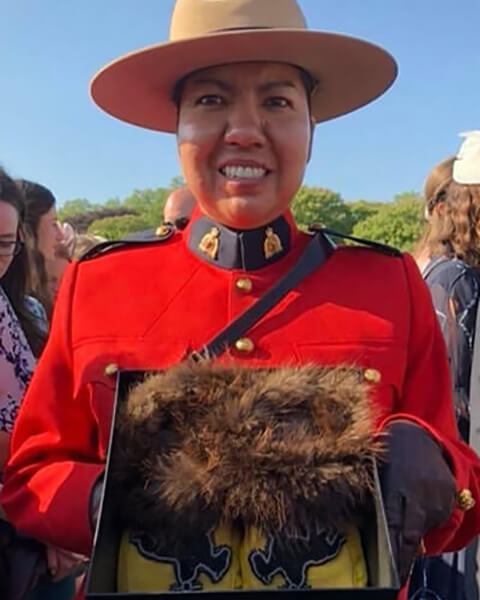
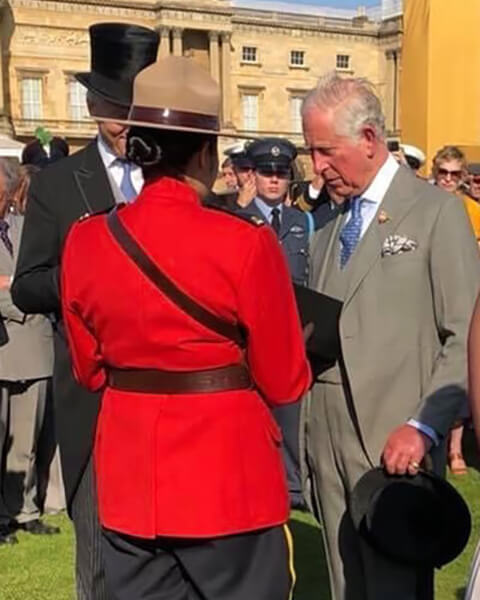
Growing up in a big family, I always knew I wanted to help people, I just didn't always know how. In my early teens, I started thinking about becoming a police officer. I didn't see any First Nations RCMP officers growing up on Mathias Colomb Cree Nation and Sherridon, Manitoba, so I joined the RCMP to show myself and others that it was possible. I joined the RCMP in 2012 and it's been a journey of hard work and determination, but also one filled with tons of reward.
Opportunities like no other
I've spent my entire RCMP career in Manitoba and have lived in communities across the province. It was a goal of mine to work in northern Manitoba so I can be closer to family and serve the First Nations people, which I've been able to do for the last 7 years. I've made life-long friendships and I've had experiences that I otherwise wouldn't have had, including meeting the future King.
In 2018, I was selected to be part of a contingent from D Division (Manitoba) to attend the 70th Birthday Patronage Celebration of His Majesty King Charles III (then the Prince of Wales) in the gardens of Buckingham Palace. I represented the RCMP along with two other police officers and two civilian employees. I was able to personally present him a gift of moccasins that were hand made by Edna Nabess, an extended family member from Mathias Colomb Cree Nation. This gift allowed me to proudly showcase where I'm from and to express my gratitude for the experience. I also was able to speak to him briefly and explain what the gift was and its importance. Had I not been a Mountie, I'm pretty sure I never would have had this opportunity.
My hope for young Indigenous Canadians
I want to make a positive impact in every community I serve and I strive to be a positive role model for Indigenous youth. My advice to young people is to believe in yourself and know that the possibilities are endless with hard work and dedication. Do not focus on the negative and do not let the bad pull you down - positive thinking is powerful! Take every opportunity to learn, grow, and better yourself. If you don't have a positive role model in your family, become that positive role model for your family. It's not always easy, but know that there is always somebody out there who believes in you and will be cheering you on every step of the way.
Fred Davis: Small-town boy finds big career with RCMP

I stepped off the train for my first posting in Grand Falls, Newfoundland and Labrador in September 1962, wearing the red serge. The officers who greeted me brought me to a rooming house and said: "Change into your uniform."
Then we went to the stadium. The professional wrestlers were in town.
We walked in and the wrestlers are fighting — the locals up by the ring!
One of them was really giving it to a wrestler. My partner and I walked up and he just grabbed the local guy and dragged him out. I couldn't believe it. I just remember standing there thinking: "What do I do? What do I do?"
If I'd had known where Gander was, I would have been the missing Mountie the next morning. (Gander, located about 100 km east of Grand Falls, is home to a large airport.)
But I'm kidding. Grand Falls was a great place to learn and work. I eventually became the first plain-clothes officer to work in central Newfoundland.
Life before the Mounties
I never thought about the RCMP when I was really young.
When I was 18, my dad sent me to the RCMP office (in Truro, Nova Scotia) to see staff sergeant Gerry Glintz, a family friend. I came out with an application filled out, and 5 months later — 14 days after my 19th birthday — I signed on in Halifax on December 1, 1961, and immediately left for Ottawa.
Having never been that far away from Truro and the youngest recruit in my troop, boy was I nervous.
I was getting along OK until one night one of the physical training sergeants took me aside and quietly said: "You're doing fine; don't be so uptight and stressed out."
That gave me the confidence and boost I needed and things went good from then on.
Career highlights
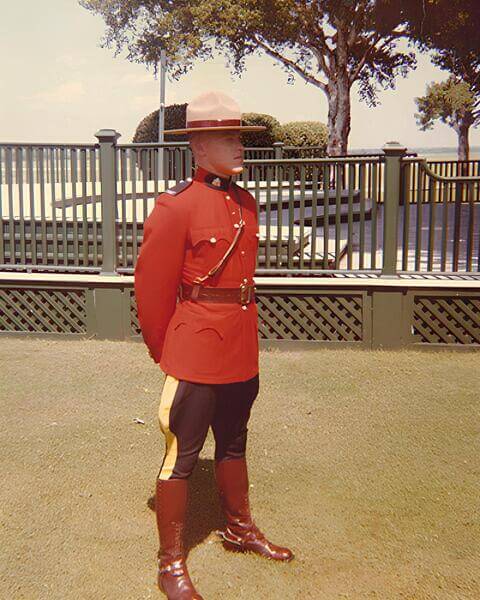
I have worked in every province and territory in Canada and internationally.
I became a court recognized drug expert, I was co-ordinator for undercover training, developed international assistance programs for Latin and South America, China, chaired international meetings in Kuala Lumpur, was elected to headquarters staff relations Representative, and was administrator of the RCMP Fairmont Training Academy in Vancouver for 10 years.
My investigative experiences include murders, armed robberies, extortion, government corruption, and kidnapping. There were also the minor criminal violations of break and entering, thefts, assaults, and many national and international drug investigations.
I've also looked after Prime Ministers, the Queen, Presidents, and high-ranking officials from other countries.
Former Prime Minister Pierre Trudeau unexpectedly got off the train in Rogersville, New Brunswick. The crowds were so excited to see him, we had a hell of a time trying to get him back on.
It was also in New Brunswick where I was probably most concerned over safety.
It was in 1972 and "Days of Concern" protests were happening. People were upset about the lack of employment opportunities and protesting on the streets of Bathurst.
Once we got near the unemployment offices, my partner and I, being in plain cloths, were placed inside the building. All staff had been removed. The angry crowd approached, broke open the plate glass doors and 100-plus came inside and occupied the building. It happened so fast.
But thankfully, there was no violence.
Promoting the RCMP

I retired in 1998 as a Staff Sergeant and I still talk to young people about the RCMP every chance I get.
I'll ask them if they're in a group: "Who's the toughest guy here?", "Who is the smartest in this group?", "Who is the best athlete?" It's all just to get a laugh and get them talking with me.
I'll ask what they're going to do when they finish school. Lots have no idea, but it always leads to a conversation.
I tell anybody if you like adventure, opportunities and challenges in life and they have the requirements to join, then look into policing.
It is an absolutely great career, and I've heard all the (negative) comebacks.
Go get involved with the community, get involved with the kids, their parents, that's where your reputation and personal satisfaction is going to come from.
Wherever you go with the RCMP, I bet you'll enjoy every day once you get there. It's the people in the organization you work with daily and the communities that make it special.
It's a great organization dedicated to making Canada better and safer. I had a lot of fun doing that.
Corporal Maureen Greyeyes-Brant: Walking my Red Road to my forever career
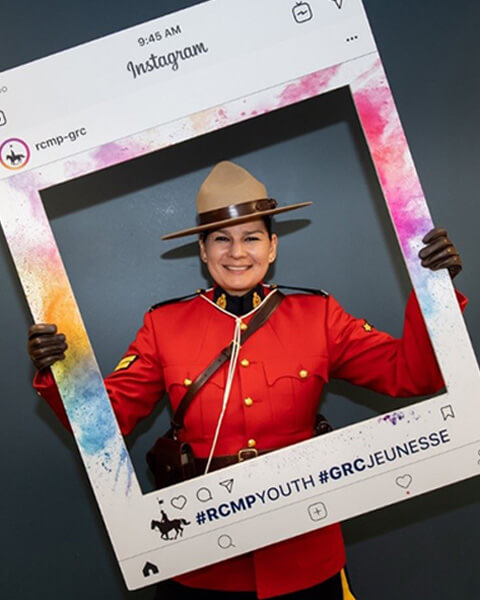
Corporal Greyeyes-Brant is a strong Plains Cree woman from Muskeg Lake Cree Nation, who was welcomed and adopted into Mohawks of the Bay of Quinte located on the territory of Tyendinaga in Ontario. This her RCMP story:
I'll start in December 2007 when I was hired as the National Coordinator of the Aboriginal Shield Program for the Drugs and Organized Crime Awareness Service. I overhauled the entire drug prevention program, while also creating new 5-day Community Facilitator and 3-day Train the Trainer facilitation manuals.
It was at this point in my career when one of my Indigenous contacts within the RCMP helped me to secure an interview with the Canadian Security Intelligence Service. I became the first- ever Proactive Aboriginal Recruiter for the Canadian Security Intelligence Service in the summer of 2011.
I then had the opportunity to work for the National Recruiting Program as the National Coordinator of the Aboriginal Pre-Cadet Training Program, which was the same program that had me interested in applying to the RCMP back in 1999. Known back then as the Aboriginal Youth Training Program, and now known as the Indigenous Pre-Cadet Training Program, I had the privileged to be sworn in as a Special Constable for the RCMP's 17-week student program.
More recently, I was honoured to undertake a year long assignment with the newly created RCMP Indigenous Collaboration, Co-Development, Accountability unit.
Increasing Indigenous representation within the organization
One program I have much confidence in is the Indigenous Pre-Cadet Training Program. It's one of the RCMP's longest running Indigenous recruiting initiatives (first started in 1994), and it's the program that I was recruited through. As the National Coordinator, I oversee a troop of 32 First Nations, Inuit and Métis candidates every year. I mentor and foster valuable relationships, hoping to change their views towards our organization and encourage them to apply to the RCMP once they successfully complete the program. It's important that new recruits get the opportunity to see themselves in us [the RCMP]. The best way to do that is to increase our Indigenous numbers and focus on Indigenous recruitment.
Two impactful moments in my RCMP career
I vividly remember heading to a call in Manitoba, where an Indigenous girl had overdosed. We got to the community first and the ambulance was still a far way back. We placed the girl into the back of our police car and started driving as fast as possible to meet up with the ambulance as quickly as we could.
I was talking to her from the passenger seat, trying to keep her awake and she asked me, "how did you do it?" I looked at her and knew exactly what she was talking about. I told her, "I learnt the hardest word in the English dictionary and I said it often. I learned the word 'no'. Sometimes you may have to say no to family and to friends. And you have to keep on saying it; 'no I am not going to have a drink, no I am not going to try drugs, no I am not going to go and hang around certain people'". I don't know whether or not that sunk in for her, but it is one of the things I've learnt in my life. I learned to pick my path, and do the best that I could do for myself.
A second scenario I vividly remember is when I was working for Canadian Security Intelligence Service as their Proactive Aboriginal Recruiter at an event in Nanaimo, British Columbia. A First Nations man came up and began yelling at me. He told me that I was a traitor to my people for working with this organization. I listened to his angry remarks and then calmly responded "I hear what you are saying. Still, let me put it into perspective for you. You are the one outside of the organization protesting and yelling that there needs to be change. I am inside the building, at the meeting tables, advocating for change and people are listening to me."
Who better to do national security for Canada, then the First Peoples of Canada? Just like who is better to do law enforcement for Canada then the First Peoples. We need those rare breed of warriors within the RCMP to fight the good fight and advocate for our Indigenous communities.
Moving forward as an organization
For any organization, I think the focus should be on reconciliation. However, conciliation is also crucial to mending many of these relationships before there can be reconciliation. We need to start having open conversations to understand one another better before even considering commencing down the true path towards reconciliation.
At the end of the day, I truly believe the RCMP has more pros than cons because we have some really great and amazing members that work for this organization. I am proud to be a First Nations Mountie, and my ability to initiate change in so many different ways. I am truly happy knowing that I can contribute to increasing the Indigenous representation within the organization. I see the changes that are slowly being made by the organization, and continue to look forward to our progress.
As a member of the RCMP, our members can make their career anything they want it to be. My goal in joining was to change the life of one Indigenous person. Throughout your career, you may experience a situation where you can have a huge impact on someone's life without even knowing it. My advice to everyone is to keep looking ahead, and to walk your own road as true to yourself as you can. To my ancestors, family and friends, I hope I make you proud on the way I have walked mine.
Sergeant Kelly Willis: A passion for adventure and helping
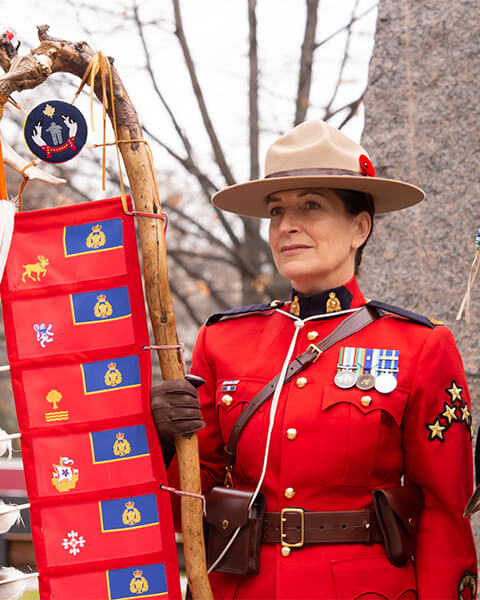
I knew the RCMP would be great for me because of the opportunities for adventure and to work anywhere in Canada.
I went to university with a plan: to get involved in law enforcement. So, I earned a degree in Criminology from the University of Ottawa in 1993.
Even though I had my degree, was bilingual, Indigenous, had a black belt in Tae-Kwon-Do, and worked part-time in the Canadian Army Reserve with the Governor General's Foot Guards, I thought there was one major obstacle blocking my way to the RCMP: My poor eyesight.
When I was at a career fair and highlighted my skills to an RCMP recruiter, I asked: "What kind of job would you have for someone with eyesight like mine?"
He replied: "Why don't you just go get your eyes fixed and have a career as a police officer."
So that's what I did. I then went to Depot in January 1997 and graduated in July when I was 27 years old.
I've worked in general duty policing in British Columbia, Northwest Territories and served with the Canadian Air Carrier Protective Program in Toronto. I also worked in Ottawa with RCMP Indigenous Relations Services, where I was involved in the early stages with the files for Missing and Murdered Indigenous Women, Restorative Justice and Truth and Reconciliation.

The United Nations dream
I always wanted to represent the RCMP on a United Nations mission. I've seen other members go and thought: "If they can do it, I can do it too."
I finally applied in 2018. I put "anywhere" as my number one choice and was selected among the first two police officers to help start the Canadian contingent with the United Nations peacekeeping mission in Mali, Africa.
We were there to help the Malians reform their police service and provide help in areas such as organized crime, community policing, sexual and gender-based violence, and counterterrorism.
When you're on the ground, you realize you're going to put all your policing skills and experience to work because there's so much to do.
I helped with project management, analyzed data and completed reports on the status of various projects related to the stabilization of the Malian Security Forces and protection of civilians as women and children are most often affected in times of conflict or war. I participated in a Board of Inquiry on a major United Nations incident, and delivered introductory Conflict Management training to the Malian Security Forces.
I immersed myself and took on extra work as a way of maximizing my experience and contributions.
Mali is one of the poorest countries in the world and it was astonishing to see how we were greeted in many places with smiles and laughter. The way of life was one where family values are important. People made do with what they had, and they were willing to share what little they had.
Taking care of each other sharing meals and celebrating events as a community was reminiscent of what I experienced growing up Cree in on my reserve of Chisasibi in Northern Quebec.
The work opens your mind up in so many ways; personal growth, career growth, cultural growth. I wouldn't have been able to do it without the support of family and my children.
The Women's Indigenous Network Network
Upon my return from the United Nations in January 2020, I worked a few different jobs related to Reconciliation, cultural representation, bias, and mentorship. I am currently with the National Public Complaints Directorate.
At some point, I began to think about my career. I have 25 years of service in this organization. I've had some amazing experiences, but there have also been some challenges.
One of the reasons I enjoy my job so much is I love meeting and helping people.
So, in March 2021, I started the Women's Indigenous Network for Indigenous women and Two-Spirit employees in the RCMP to identify and address barriers related to our recruitment, retention, and career development. The Women's Indigenous Network provides a natural mentorship aspect which helps in unifying and strengthening both our voice and presence in this organization.
We communicate through monthly meetings, weekly emails, and a monthly newsletter which is disseminated to Women's Indigenous Network partners.
One of the United Nations core values is respect for diversity. I want to make sure that the underrepresented voices in our organization are heard and their faces are seen. When you have diversity, you have amazing perspectives and different ways of doing things that are more representative of our community and police services.
I founded the Women's Indigenous Network but it's thanks to the support and efforts of so many people that it has grown and is now recognized as a key consultative stakeholder. I was once asked by an Indigenous protester, "How can you be part of this organization?" I said: "What better way to make change happen than to be part of the organization and work for change from within."
I am excited about where the RCMP is going because I see the organization making changes. And when I see another person succeed, that fills my spirit.
Corps Sergeant Major Alan McCambridge: A lifelong dedication to rescue and protection

My life was always destined for the military. Growing up, my father was in the Navy and my mother worked for the admiral's office. Having a military-oriented family, I learned a lot about policing and it ignited my interest in working at sea. I first started my career with the Navy's sea-cadet program; specifically, by working in the submarines.
Although I began my military career working for the Navy, I began considering a career with the RCMP. I thought working with the RCMP might allow me more time at home with my family. I wanted a career where I would be able to be there for the important moments in my kids' lives. I was always captivated by the presence the RCMP held in the North. It took me 2 attempts, but I finally got in with the RCMP.
In 1981, I was sworn into the RCMP at Depot Division in Saskatchewan. My career took me all over Canada. I started out as a young officer in Stonewall, Manitoba, then to The Pas, Manitoba, Inuvik, Yellowknife, Fort Smith, back to Yellowknife, Inuvik (all in the Northwest Territories), Kandahar (Afghanistan), Yellowknife, and finally to my current home in Ottawa, Ontario.

- Moment I cherish in my tenure with the RCMP
-
I have been so blessed in my career with many opportunities. I think the biggest thing for me in my career is that I was able to be home for the birth of all my children. When I started out as a young Mountie, I was working 10 days in a row in Yellowknife, and then 2 days off to go back to Inuvik (over the course of 7 months). Because of this I was able to be there when my son Aaron was born. This is something I will always cherish.
I will never forget the impactful 29 years I served in the artic. I was stationed in Inuvik, Yellowknife, and Fort Smith in the Northwest Territories (NWT). In working the Mackenzie River, Great Slave Lake and the Beaufort Sea, I was taught resilience and teamwork in order to successfully execute each search and rescue mission. I had the opportunity to lead sea patrol missions and search and rescue, and was the Crisis Negotiator responsible for instructing for the Critical Incident Program.
Another time in my career that has stood out for me is when I worked for a year in Kandahar, Afghanistan. From 2006 to 2007, I worked in Kandahar as a National Police Trainer and mentor to Senior Afghan Police Commanders. I also worked in Kandahar on an International Negotiator Working Group that gave me immense experience in negotiating hostage situations and international kidnappings. I remember looking back on those missions and thinking to myself: "Where in your wildest dreams would you ever imagine working on a case like this back when you were in Depot?"
- My motto as Corps Sergeant Major
-
What I have learned in dealing with Crisis Intervention since 1991 is that it is always important to take care of oneself first. Any level of employee – whether it be civilian, public servant or regular member – we always have to prioritise our own wellbeing.
When we break a leg or an elbow, we take time off. But I'm not referring to physical wellness. It's our mental wellness that needs time to heal too. Members undergo many stressors and encounter many traumatic situations throughout their career; it can take a toll over time. When our members have a moment of difficulty, they need to remember that there is no shame in taking a knee – take a pause and catch your breath. I'd like to continue to help reduce the stigma surrounding member wellness.
- What the red serge means to me
-
Every day I get to wake up and work alongside people with outstanding dedication to our organization. I enjoy seeing the passion in young officers. I hope that they continue on to always seek guidance, and strive to constantly learn and adapt. There are so many lessons that I am glad to have learned along the way.
Over the years, I have been blessed with the support and guidance of my family, those who I have met along the way, and my mentors who have helped me navigate difficult situations. As I reflect on my career I can't help but feel fortunate enough to find a calling that, for me, doesn't feel like a job. This is my calling.
- Date modified: